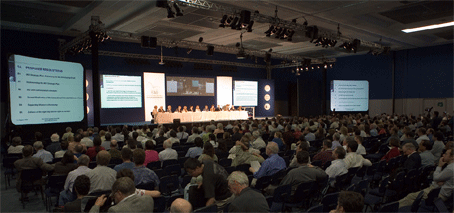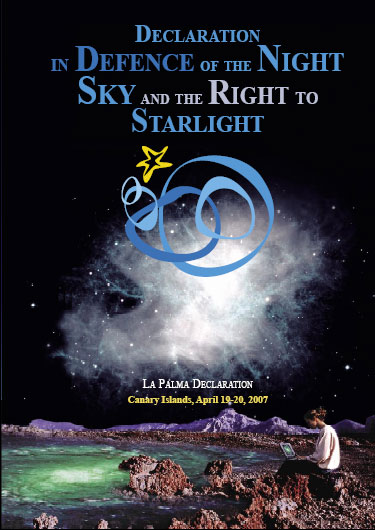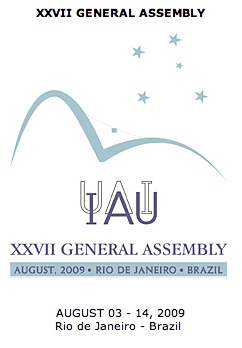IAU Resolution B5
IAU GENERAL ASSEMBLY
Resolution B5 in Defence of the Night Sky and the Right to Starlight

The International Astronomical Union XXVII General Assembly,
Recalling
1. the IAU/UNESCO International Year of Astronomy 2009 goal 8: facilitate the preservation and protection of the world's cultural and natural heritage of dark skies in places such as urban oases, national parks and astronomical sites,
2. the Declaration approved during the International Conference in Defence of the Quality of the Night Sky and the Right to Observe Stars (La Palma, Canary Islands, 2007),
Recognising that
1. the night sky has been and continues to be an inspiration of humankind, and that its contemplation represents an essential element in the development of scientific thought in all civilisations,
2. the dissemination of astronomy and associated scientific and cultural values should be considered as basic content to be included in educational activities,
3. the view of the night sky over most of the populated areas of the Earth is already compromised by light pollution, and is under further threat in this respect,
4. the intelligent use of unobtrusive artificial lighting that minimises sky glow involves a more efficient use of energy, thus meeting the wider commitments made on climate change, and for the protection of the environment,5. tourism, among other players, can become a major instrument for a new alliance in defence of the quality of the nocturnal skyscape.
considering
1. the role of the IAU Division XII Commission 50 and its WG Controlling Light Pollution,
2. the role of the IYA2009 Cornerstone Project Dark Skies Awareness,
resolves that
1. An unpolluted night sky that allows the enjoyment and contemplation of the firmament should be considered a fundamental socio-cultural and environmental right, and that the progressive degradation of the night sky should be regarded as a fundamental loss.
2. Control of obtrusive and sky glow-enhancing lighting should be a basic element of nature conservation policies since it has adverse impacts on humans and wildlife, habitats, ecosystems, and landscapes.
3. Responsible tourism, in its many forms, should be encouraged to take on board the night sky as a resource to protect and value in all destinations.
4. IAU members be encouraged to take all necessary measures to involve the parties related to skyscape protection in raising public awareness – be it at local, regional, national, or international level – about the contents and objectives of the International Conference in Defence of the Quality of the Night Sky and the Right to Observe Stars [http://www.starlight2007.net/], in particular the educational, scientific, cultural, health and recreational importance of preserving access to an unpolluted night sky for all humankind.
further resolves that
1. Protection of the astronomical quality of areas suitable for scientific observation of the Universe should be taken into account when developing and evaluating national and international scientific and environmental policies, with due regard to local cultural and natural values.
Proposers at the IAU GA: Richard J. Wainscoat and Malcolm G. Smith
 IAU Web Page - Resolutions
IAU Web Page - Resolutions
LOOKING FOR SOMETHING?


Starlight Initiative collaborates with the
PORTAL TO THE HERITAGE OF ASTRONOMYUpdates
- New Brochure of UNESCO`s MAB Programme partnership
- Galicia adopts the Starlight Declaration
- Starlight at the 39th session of the World Heritage Committee
- International declaration warning about the effects of blue-rich white light
- Flyer - Starlight Initiative in partnership with the UNESCO MAB Programme
- Astronomical Heritage - Hawaii 2015
- 2015 International Year of Light
- Montsec - Starlight Destination and Reserve
Starlight Finder
Starlight related links
![]()
Covenant of Mayors Related Initiative
![]()
Colaborating with IAU Working Group
![]()
IUCN Dark Sky Advisory Group
![]()
Dark Skies Awareness Project
![]()
Partnership Unesco-MaB
![]()
Member of the Knowledge Network
![]()
Instituto de Astrofísica de Canarias
|
The Starlight Initiative is designed as an international action in defence of the values associated with the night sky and the general right to observe the stars. It is open to the participation of all scientific, cultural, environmental, and citizens' organizations... |
In partnership with: |
|
|
|



